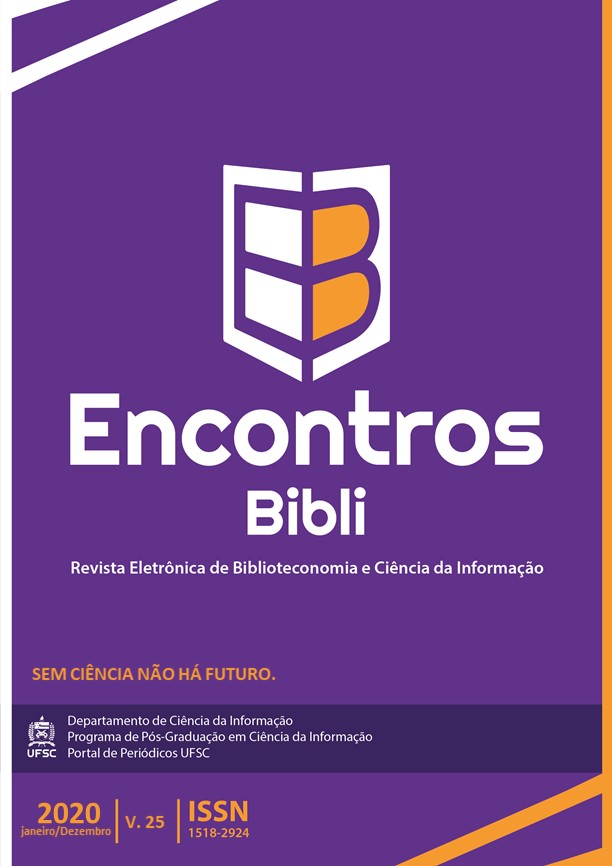Internal Audit Analysis as Production Process of Strategical Information
DOI:
https://doi.org/10.5007/1518-2924.2020.e71393Keywords:
Strategic Information, Internal Audit, Information ManagementAbstract
Objective: Check the degree of adherence of the internal audit to the PPIE - Principles of Strategic Information Production, proposed by Washington Platt.
Method: The approach is an action research, of an applied nature, since a relationship was established between knowledge and action, implicated in the situation investigated in face of reality; with a view to researching Platt's (1974) model and documentary focused on the examination of IPPF norms. Still, we used the interview survey to investigate the stages of strategic information production in the practice of auditing.
Result: The survey results indicate that the practical steps of internal audit are highly adherent to the strategic information creation model used.
Conclusions: It concludes, based on that theory, that the internal audit is a process of strategical information production.
Downloads
References
ALBUQUERQUE, Sérgio Farias de. A representação das necessidades de informação gerencial nos núcleos de informação para avaliação e gestão de empreendimentos. 2012. Tese (Doutorado em Ciência da Informação) - Universidade de Brasília, Brasília, 2012.
BALDISSERA, Adelina. Pesquisa-ação: uma metodologia do “conhecer” e do “agir” coletivo. Sociedade em Debate, v. 7, n. 2, p. 5-25, 2012.
CARVALHAL, Karla Lustosa de Mello. A atividade de produção de informações estratégicas: paralelo entre os princípios de Washington Platt e a gestão comercial das empresas de mídia impressa em Brasília. 2016. Dissertação (Mestrado em Ciência da Informação) - Universidade de Brasília, Brasília, 2016.
CHOO, C. W. A organização do conhecimento. São Paulo: SENAC, 2006.
CUNHA, José Humberto da Cruz. Estudo do emprego da taxonomia como instrumento auxiliar para decisões táticas no processo de auditoria. 2017. 210 f., il. Tese (Doutorado em Ciência da Informação) - Universidade de Brasília, Brasília, 2017.
FONSECA, João José Saraiva. Metodologia da pesquisa científica. Fortaleza: UFCE, 2002.
GIL, Antonio Carlos. Métodos e técnicas de pesquisa social. São Paulo: Atlas, 1999.
HERRING, J. P. Key intelligence topics: a process to identify and define intelligence needs. Competitive Intelligence Review, v. 10, n. 2, p.4-14,1999.
INSTITUTE OF INTERNAL AUDITORS (IIA). About IAA: mission and history. Lake Mary: IIA, 2019. Disponível em: https://global.theiia.org/about/about-the-iia/Pages/About-The-Institute-of-Internal-Auditors.aspx. Acesso em 26 de dez. 2019.
INSTITUTO DOS AUDITORES INTERNOS DO BRASIL (IIA). Normas internacionais para a prática profissional de auditoria interna. São Paulo: IIA, 2017. Disponível em: https://iiabrasil.org.br/ippf/normas-internacionais. Acesso em: 26 de nov. de 2019.
PLATT, W. A produção de informações estratégicas. Rio de Janeiro: Agir, 1974.
RODRIGUES, William Costa et al. Metodologia científica. Pacarambi: Faetec/IST, 2007.
THIOLLENT, Michel J. M. Metodologia da pesquisa-ação na instituição educativa. São Paulo: Cortez, 2011.
Downloads
Published
How to Cite
Issue
Section
License
Copyright (c) 2020 Gabriela Sofia Belo Brandes, José Humberto da Cruz Cunha, Rogério Henrique de Araújo Júnior, Alex Laquis Resende

This work is licensed under a Creative Commons Attribution 4.0 International License.
The author must guarantee that:
- there is full consensus among all the coauthors in approving the final version of the document and its submission for publication.
- the work is original, and when the work and/or words from other people were used, they were properly acknowledged.
Plagiarism in all of its forms constitutes an unethical publication behavior and is unacceptable. Encontros Bibli has the right to use software or any other method of plagiarism detection.
All manuscripts submitted to Encontros Bibli go through plagiarism and self-plagiarism identification. Plagiarism identified during the evaluation process will result in the filing of the submission. In case plagiarism is identified in a manuscript published in the journal, the Editor-in-Chief will conduct a preliminary investigation and, if necessary, will make a retraction.
This journal, following the recommendations of the Open Source movement, provides full open access to its content. By doing this, the authors keep all of their rights allowing Encontros Bibli to publish and make its articles available to the whole community.
Encontros Bibli content is licensed under a Creative Commons Attribution 4.0 International License.
Any user has the right to:
- Share - copy, download, print or redistribute the material in any medium or format.
- Adapt - remix, transform and build upon the material for any purpose, even commercially.
According to the following terms:
- Attribution - You must give appropriate credit, provide a link to the license, and indicate if changes were made. You may do so in any reasonable manner, but not in any way that suggests the licensor endorses you or your use.
- No additional restrictions - You may not apply legal terms or technological measures that legally restrict others from doing anything that the license permits.

























